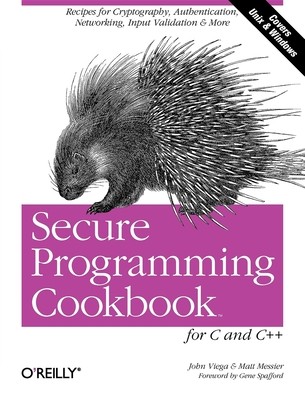
- We will send in 10–14 business days.
- Author: John Viega
- Publisher: O'Reilly Media
- ISBN-10: 0596003943
- ISBN-13: 9780596003944
- Format: 17.8 x 23.5 x 3.8 cm, minkšti viršeliai
- Language: English
- SAVE -10% with code: EXTRA
Reviews
Description
Password sniffing, spoofing, buffer overflows, and denial of service: these are only a few of the attacks on today's computer systems and networks. At the root of this epidemic is poorly written, poorly tested, and insecure code that puts everyone at risk. Clearly, today's developers need help figuring out how to write code that attackers won't be able to exploit. But writing such code is surprisingly difficult.
Secure Programming Cookbook for C and C++ is an important new resource for developers serious about writing secure code. It contains a wealth of solutions to problems faced by those who care about the security of their applications. It covers a wide range of topics, including safe initialization, access control, input validation, symmetric and public key cryptography, cryptographic hashes and MACs, authentication and key exchange, PKI, random numbers, and anti-tampering. The rich set of code samples provided in the book's more than 200 recipes will help programmers secure the C and C++ programs they write for both Unix(R) (including Linux(R)) and Windows(R) environments. Readers will learn:
- How to avoid common programming errors, such as buffer overflows, race conditions, and format string problems
- How to properly SSL-enable applications
- How to create secure channels for client-server communication without SSL
- How to integrate Public Key Infrastructure (PKI) into applications
- Best practices for using cryptography properly
- Techniques and strategies for properly validating input to programs
- How to launch programs securely
- How to use file access mechanisms properly
- Techniques for protecting applications from reverse engineering
Secure Programming Cookbook for C and C++ is destined to become an essential part of any developer's library, a code companion developers will turn to again and again as they seek to protect their systems from attackers and reduce the risks they face in today's dangerous world.
EXTRA 10 % discount with code: EXTRA
The promotion ends in 22d.17:57:39
The discount code is valid when purchasing from 10 €. Discounts do not stack.
- Author: John Viega
- Publisher: O'Reilly Media
- ISBN-10: 0596003943
- ISBN-13: 9780596003944
- Format: 17.8 x 23.5 x 3.8 cm, minkšti viršeliai
- Language: English English
Password sniffing, spoofing, buffer overflows, and denial of service: these are only a few of the attacks on today's computer systems and networks. At the root of this epidemic is poorly written, poorly tested, and insecure code that puts everyone at risk. Clearly, today's developers need help figuring out how to write code that attackers won't be able to exploit. But writing such code is surprisingly difficult.
Secure Programming Cookbook for C and C++ is an important new resource for developers serious about writing secure code. It contains a wealth of solutions to problems faced by those who care about the security of their applications. It covers a wide range of topics, including safe initialization, access control, input validation, symmetric and public key cryptography, cryptographic hashes and MACs, authentication and key exchange, PKI, random numbers, and anti-tampering. The rich set of code samples provided in the book's more than 200 recipes will help programmers secure the C and C++ programs they write for both Unix(R) (including Linux(R)) and Windows(R) environments. Readers will learn:
- How to avoid common programming errors, such as buffer overflows, race conditions, and format string problems
- How to properly SSL-enable applications
- How to create secure channels for client-server communication without SSL
- How to integrate Public Key Infrastructure (PKI) into applications
- Best practices for using cryptography properly
- Techniques and strategies for properly validating input to programs
- How to launch programs securely
- How to use file access mechanisms properly
- Techniques for protecting applications from reverse engineering
Secure Programming Cookbook for C and C++ is destined to become an essential part of any developer's library, a code companion developers will turn to again and again as they seek to protect their systems from attackers and reduce the risks they face in today's dangerous world.


Reviews